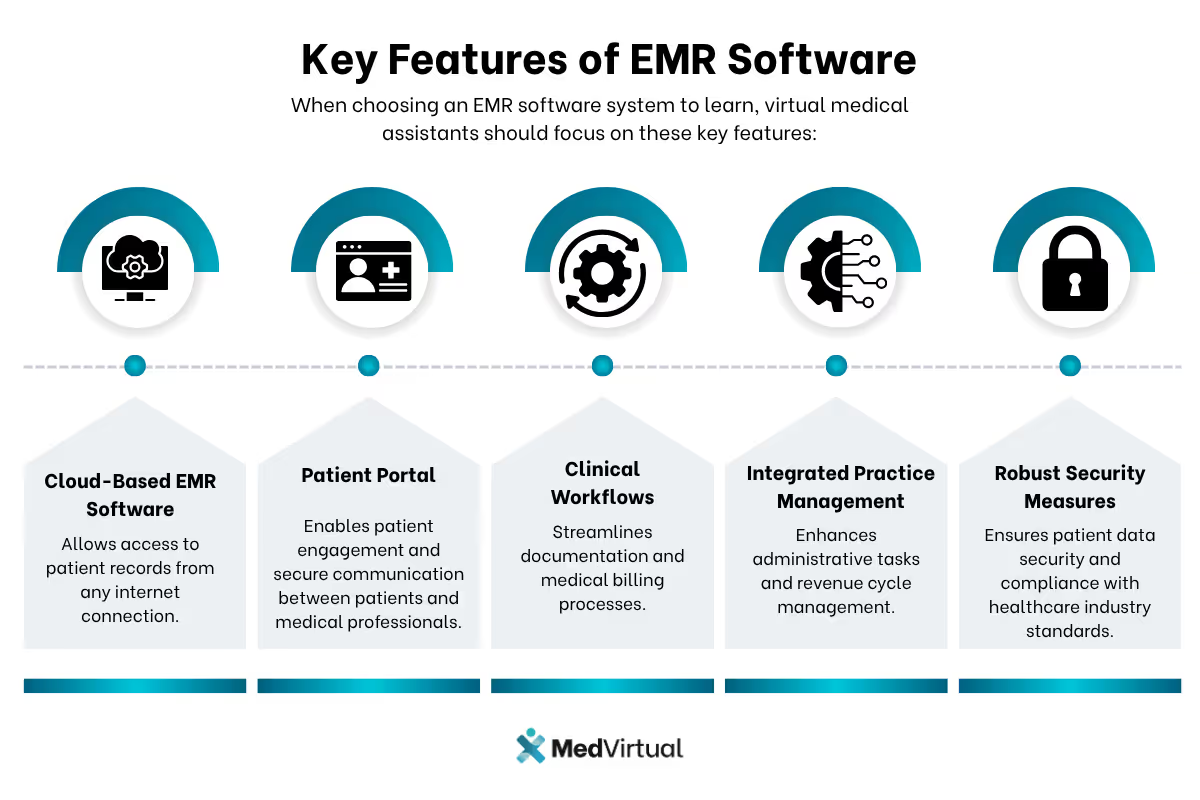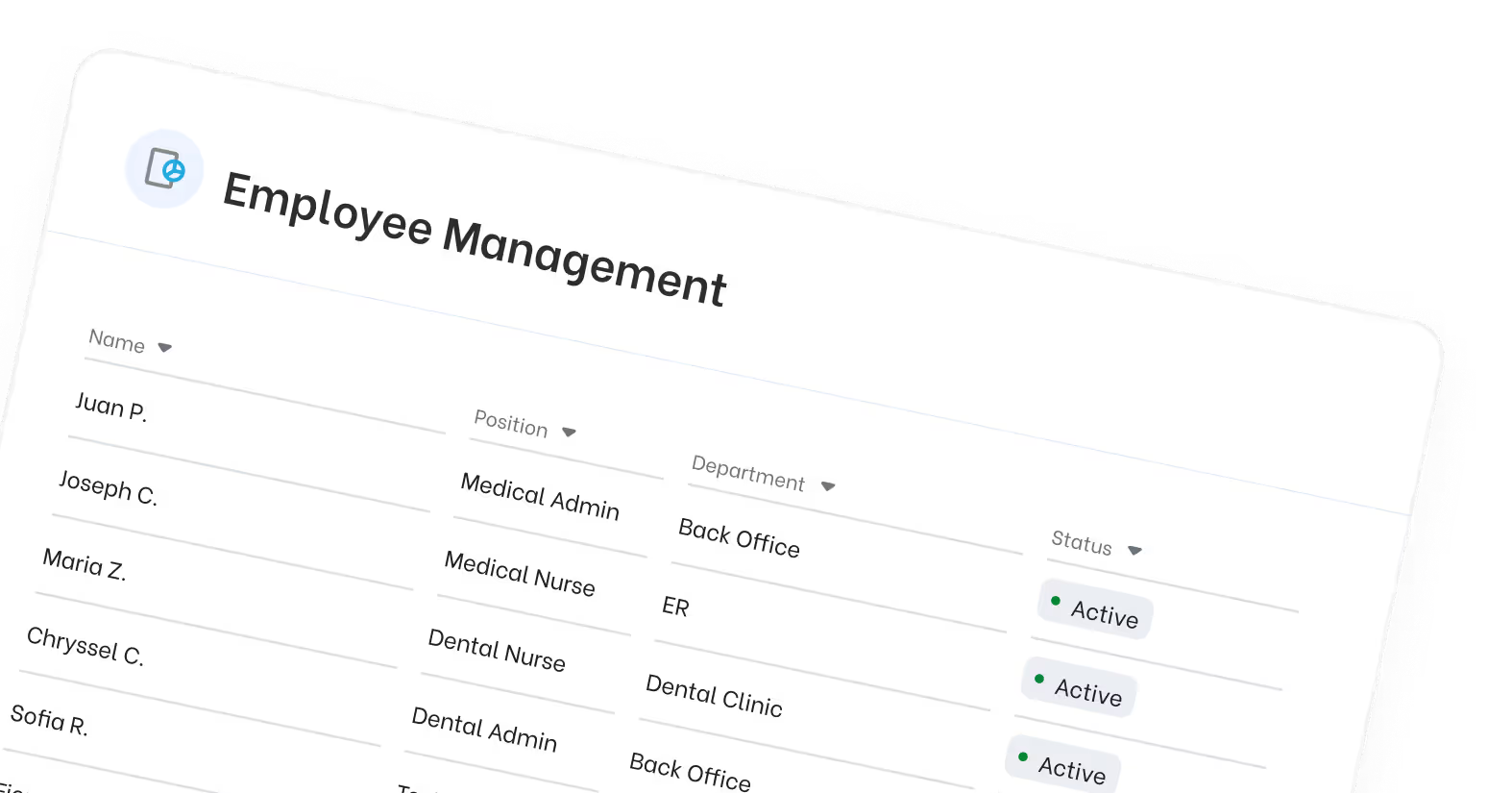Best EMR (Electronic Medical Records Systems) to Learn as a Virtual Medical Assistant 2025
%2520to%2520Learn%2520as%2520a%2520Virtual%2520Medical%2520Assistant%25202025.avif)
Electronic Medical Records (EMR) systems are essential tools that enable virtual medical assistants in the US to efficiently manage patient records, streamline workflows, and support healthcare providers in delivering high-quality care. Learning the best EMR systems equips you with the skills needed to navigate diverse US healthcare settings, from small private practices to large hospital systems. Choosing the right EHR system ensures seamless integration, adaptability, and user satisfaction for providers and staff.
EMR systems help US healthcare providers manage patient records effectively. As a virtual medical assistant, mastering top EMR platforms improves workflow and patient care. High customer satisfaction ratings indicate platforms that enhance efficiency and professional fulfillment. Whether working with small clinics or large healthcare organizations, proficiency with these systems is critical.
Partnering with a trusted US-based virtual staffing agency like MedVirtual can accelerate your career by connecting you with healthcare providers seeking virtual medical assistants trained in leading EMR systems.
This article outlines the top EMR software for virtual medical assistants in the US, key features to consider when selecting a system, and how mastering these platforms can expand your career opportunities in the evolving US healthcare landscape.
What is an Electronic Health Record (EHR) System?
An electronic health record (EHR) system is a digital version of a patient’s medical history. EHR systems are a core component of health information technology, which emphasizes certification, security, and interoperability to meet standards set by certification bodies. It includes patient data such as medical history, treatment plans, lab results, and medication management details. EHR software enhances patient engagement and clinical workflows by allowing healthcare professionals to access patient data from any location.

Top 7 EMR Software Systems for Virtual Medical Assistants
1. Epic
Epic is a leading EHR solution and comprehensive healthcare software platform utilized by large healthcare organizations. It offers a patient portal, population health management tools, and strong security measures. Virtual medical assistants using Epic can aid in clinical documentation and help physicians achieve better patient outcomes.

2. Cerner Ambulatory EHR
Cerner (now known as Oracle Health) offers a cloud-based EHR solution tailored for hospitals and specialty practices. Cerner's solutions are also designed for community hospitals, providing affordability and ease of use for smaller healthcare facilities. It includes integrated practice management tools and clinical decision support features, assisting healthcare providers in reducing medical errors and enhancing patient care.

3. eClinicalWorks
eClinicalWorks EHR software is widely used by private and small practices and medium sized medical practices. It offers a cloud-based platform for administrative tasks, revenue cycle management, and patient engagement tools, and provides comprehensive tools for practice management and clinical efficiency. Additionally, eClinicalWorks provides independent practices with specialty-specific solutions.

4. Athenahealth
Athenahealth is a cloud-based EHR system designed for medical practitioners and physician users. It streamlines practice management solutions, medical billing, and quality reporting to enhance clinical workflows, making it a leading choice for virtual medical assistants supporting healthcare practices.

5. NextGen Healthcare
NextGen Healthcare offers a tailored EMR software system designed for solo practitioners and multiple medical specialties, including physical therapy. It includes integrated practice management features, patient care solutions, and tools for clinical efficiency that support healthcare providers.

6. AdvancedMD
AdvancedMD offers AdvancedEHR, an all-in-one medical practice software with billing and administrative tools. It includes a patient portal, document management, e-prescriptions, and works on iOS devices. The system customizes access for different users to simplify workflows. It integrates with revenue cycle management to boost efficiency. Features include appointment and billing management, clinical workflows, lab integration, patient records, reporting, scheduling, and voice recognition. If you ever encounter any common issues with the AdvancedMD login, read this guide to get help.

7. Zanda
Zanda, formerly known as Power Diary, is a cloud-based clinic management system tailored for allied health clinics. It supports appointment scheduling, client records, billing, note-taking, and secure telehealth. Zanda is widely used by solo therapists and multi-location clinics, including psychologists, speech therapists, physical therapists, and more.

How to Choose the Right EMR System to Learn First
As a virtual medical assistant, deciding which EMR system to start with can feel overwhelming. Each platform offers unique features, serves different types of healthcare practices, and it's important to select an EHR that fits the unique needs of a medical practice rather than opting for a generic solution. This section will help you make an informed decision based on your career goals, the types of practices you wish to support, and the practice management system features offered by each EMR. This will help you make an informed decision based on your career goals, the types of practices you wish to support, and the practice management system features offered by each EMR.
Consider the Practice Type You Want to Support
- Large Hospitals & Health Systems: If you're looking to collaborate with large hospital networks or enterprise-level practices, Epic and Cerner are excellent starting points. These systems enjoy widespread adoption across major healthcare organizations and provide robust functionality.
- Small or Private Practices: For those interested in assisting independent providers or smaller clinics, eClinicalWorks, Athenahealth, or NextGen Healthcare may be more applicable. These platforms are generally more streamlined and easier to learn.
Evaluate Ease of Learning and Accessibility
- Training Resources: Some platforms, such as Athenahealth and eClinicalWorks, provide accessible online training modules, certification programs, or sandbox environments for practice.
- Community Support: Look for systems with robust user communities or discussion forums where you can receive assistance quickly.
- Cloud-Based Platforms: Starting with cloud-based systems (like Athenahealth or eClinicalWorks) can be advantageous if you're new to EMR tools, as they typically require fewer technical skills to operate.
Think About Transferable Skills
Many core skills, such as data entry, appointment scheduling, documentation, and HIPAA-compliant communication, are transferable across most EMR platforms. Concentrate on acquiring these universally applicable skills while you specialize in one or two systems.
Certifications That Add Value
- Explore certification programs or badges (e.g., eClinicalWorks Certified User) that enhance your credibility.
- If you're aiming for long-term career growth, certifications in Epic (through a healthcare employer) or Cerner may open doors to higher-paying roles.
Key Features of EMR Software
When choosing an EMR software system to learn, virtual medical assistants should focus on these key features:
- Cloud-Based EMR Software: Allows access to patient records from any internet connection.
- Patient Portal: Patient portals are secure online platforms integrated with certified EHRs that facilitate effective communication between healthcare providers and patients. These portals enable sharing clinical information and automate health maintenance tasks, enhancing patient engagement and satisfaction.
- Clinical Workflows: Streamlines documentation and medical billing processes.
- Integrated Practice Management: Enhances administrative tasks and revenue cycle management.
- Robust Security Measures: Ensures patient data security and compliance with healthcare industry standards.

Security and Privacy in EMR Systems
Security and privacy are critical in any electronic medical record (EMR) system due to the sensitive patient data involved. Reliable EMR systems use encryption, firewalls, and secure authentication to protect records from unauthorized access.
Compliance with HIPAA ensures confidentiality and integrity of patient information. Regular security audits and software updates help prevent data breaches and cyber threats, maintaining trust between patients and healthcare organizations.
EHR System Training and Support
Effective training and ongoing support are essential for successful EHR adoption. Systems should offer various training resources like online tutorials, webinars, and in-person sessions. User-friendly interfaces help medical professionals quickly integrate the system into workflows.
Continuous support via phone, email, or chat ensures prompt issue resolution. Regular updates keep the system compliant with regulations and technology advances, maximizing benefits and improving patient care.
EHR System Pricing and Cost
EHR system costs vary based on practice size, users, and features. Providers should consider total ownership costs, including setup, subscriptions, support, training, and customization.
Evaluating return on investment (ROI) involves assessing improvements in efficiency, patient care, and revenue cycle management. Flexible pricing models, such as tiered plans or long-term discounts, help organizations select options that fit their budget and needs.
EHR System Reporting and Analytics
A robust EHR system offers reporting and analytics to support data-driven decisions. It generates insights on patient outcomes, clinical quality, and practice efficiency.
Advanced features like population health management and predictive analytics help identify trends, monitor high-risk patients, and guide interventions. Utilizing these tools optimizes workflows, improves care quality, and drives continuous organizational improvement.
EHR System Scalability and Flexibility
Scalability and flexibility allow EHR systems to adapt as healthcare organizations grow or change. Systems should support added users, new specialties, and diverse settings.
Integrated practice management and specialty support enable customization to workflows. Cloud-based solutions offer secure, remote access and easy scaling. Scalable, flexible EHRs maintain efficiency and quality care across various practice sizes and environments.
Benefits of Learning EMR Systems as a Virtual Medical Assistant
- Enhance Patient Care: Assist in managing medical records, reducing medical errors, and improving clinical outcomes.
- Support Healthcare Facilities: Work with large healthcare organizations, private practices, and specialty practices.
- Improve Efficiency: Help healthcare professionals optimize their practice management solutions and enable physicians to focus on patient care.
- Expand Career Opportunities: Gain expertise in cloud-based EHR solutions and top EHR systems used in healthcare settings.
Learning EMR Systems as a Virtual Medical Assistant
As a virtual medical assistant, learning to use EMR systems is a valuable skill that will enable you to work efficiently in various healthcare settings. Whether you choose to specialize in Epic, Cerner, eClinicalWorks, Athenahealth, or NextGen Healthcare, each system offers unique features that support healthcare providers in delivering high-quality patient care. Understanding how these systems function, their core features, and how to use them effectively will make you an asset to any healthcare team.
By mastering EMR software, you position yourself for career growth, enhance healthcare accessibility, and contribute to improving patient outcomes. The future of healthcare is digital, and becoming proficient with EMR systems is an excellent way to stay ahead of the curve.
Spotlight: MedVirtual – Your Gateway to Remote Healthcare Work
If you’re ready to turn your EMR training into a meaningful career, MedVirtual can help you take the next step. As a trusted virtual staffing agency, MedVirtual connects skilled virtual medical assistants with healthcare providers across the country.
Whether you're just starting or looking to specialize in a specific EMR system like Epic, Cerner, or eClinicalWorks, MedVirtual offers placement opportunities that align with your experience and growth goals. Their team collaborates closely with clinics, private practices, and healthcare organizations to ensure that every virtual assistant is set up for success from day one.
Why Choose MedVirtual?
- Specialized Healthcare Placements: Work with top-tier providers in telemedicine, private practice, or specialty clinics.
- Remote Flexibility: Perform meaningful work from home while supporting the evolving needs of healthcare.
- Ongoing Training Support: Access tools and guidance to deepen your expertise in EMR software and patient care workflows.
- Career Pathways: Whether you aim to grow into clinical coordination or EMR consulting, MedVirtual can help you achieve your goals.
By partnering with MedVirtual, you’ll not only find work but also build a purpose-driven career supporting healthcare teams that rely on digital tools and human connection.
Ready to make your skills matter? MedVirtual is here to help you thrive in the virtual healthcare world.
%2520to%2520Learn%2520as%2520a%2520Virtual%2520Medical%2520Assistant%25202025_CTA.avif)
Join Our Team as a Virtual Medical Assistant!
Are you passionate about healthcare and looking for a remote opportunity? We're hiring Virtual Medical Assistants to support medical practices and enhance patient care. Your responsibilities will include managing patient records, performing data entry, and contributing to the evolution of the EHR market. If you're ready to improve clinical workflows and streamline healthcare operations from the comfort of your home, we want to hear from you!






